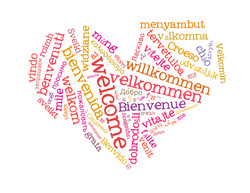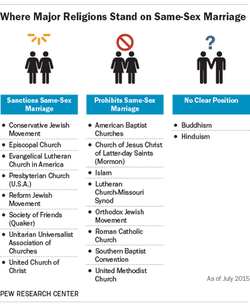Welcoming and Affirming Lesbian, Gay, Bisexual, and Transgender Persons and Families

Will I really be welcome here? What does "welcome" mean?
When a congregation says they are "welcoming", what this truly means can run the gamut from "we won't ask you to leave" to "this is a predominantly gay church" or "you can be ordained in our denomination" or "you can be married here". LGBT Faith Positions by Tradition Let's flesh out some options for what "welcoming" means: 1) Locally welcoming Sometimes a congregation is 'gay/trans friendly', although the official denominational stance is not. This means you can find a great, supportive local faith family, but you cannot be married in the congregation nor be an 'out' LGBT leader within the denomination. Historically, groups of such congregations have banded together within denominations in order to enable conversation about the issues and ultimately create change at the wider denominational level. Groups all have different ways of marking such a level of acceptance, which can look like a confusing 'hanky code' to newcomers. There are "More Light" Presbyterian churches, "Open and Affirming" United Church of Christ congregations, "Reconciling in Christ" Lutheran churches, etc, etc, etc. These groups often offer congregational resources for education and advocacy. Believe Out Loud is the next generation of such groups -- a confederation of mostly mainline Protestant denominational advocacy groups and US national LGBT organizations. Beware the "ex-gay" or "ex-trans" groups who "welcome" you so that you will change to fit their program. 2) National/International LGBT religious advocacy groups While you may not find any local congregations of a particular denomination that are openly supportive, you can sometimes find a local branch of a national/international advocacy group to join. Dignity is one of the oldest of such groups for Roman Catholics. Integrity is the Episcopalian one. United Methodists have Affirmation. There are Rainbow Baptists, as well as gay, lesbian, bisexual, and transgender groups for Buddhists, Jewish people, Muslims, Wiccans, etc. 3) Denominationally welcoming and affirming Sometimes an entire denomination has passed important legislation at national or even international levels. This is marked not only by welcoming LGBT people, but also by LGBT family and vocational recognition: 'out' LGBT couples can be married by willing ministers and people in committed relationships can be ordained to congregational ministry. Individual congregations have the choice to educate themselves for advocacy or not, so here, acceptance at the local level is what will determine your experience of welcome. Within traditional faith groups, this list is small, but growing: Conservative Jewish Movement (USCJ) Episcopal Church Evangelical Lutheran Church in America (ELCA) Jewish Reconstructionist (RRC) Presbyterian Church, USA (PCUSA) Religious Society of Friends (Quakers) Union for Reform Judaism (URJ) Unitarian Universalist Association of Congregations (UUA) United Church of Christ (UCC) Unity Worldwide Ministries 4) Historically LGBT denominations Also known as 'gay churches', these groups are, of course, open to non-LGBT people, but they were born as ministries to LGBT people who were welcome nowhere else. Their congregational cultures are founded on fairness. The big international Christian fellowship is the Metropolitan Community Church, but there are many independent/non-denominational congregations who also share this structure. These congregations tend to have conservative Christian-to-Pentecostal culture and have been the backbone of LGBT advocacy in their communities, historically. If you find a congregation like this, you'll also find out who the friendly health services professionals are in town, where to find a lawyer for your adoption, and which restaurants are the weekend hot spots. Pagan, Neopagan, and Wiccan groups also generally have long histories of LGBT acceptance. 5) Affiliates Where you can't find a religious group, you can nearly always find a PFLAG chapter, which is a national supportive advocacy organization of Parents Friends and Family of LGBT people and can be a great resource for navigating your local religious scene. These groups are your first line of support in rural and the most conservative areas. Starting points for inquiry In the end, it takes a village to welcome LGBT people. These categories are an attempt to describe the shifting picture of LGBT progress in the religious scene. They're incomplete, from a mainly mainline Christian point of view, and don't reflect reality everywhere. Some groups fit several categories! International religious politics are a whole other issue. But this is a good place to start. Remember where you feel comfortable practicing your faith will depend on what's available in your community, what your faith background is, and how comfortable you are with your own identity. Take your time, find trustworthy friends, and allow for your own change and growth. Micah Sheppard, M.Div. 5/3/2014, revised 7/2015 |
Congregations
This list is mainly based on denominational stances and individual groups' websites. It will change with your input.
* Denotes officially Welcoming or Open and Affirming congregations. LGBT people participate equally here, including in leadership and marriage. Buddhist Tibetan Losel Shedrup Ling (Knoxville) Milarepa Ösel Chö Dzong Retreat Center (Tallassee) Zen Mountain Solid, Water Reflecting Sangha (Knoxville) Christian - (TN map) Baptist First Baptist Church of Jefferson City Grace Covenant Church (Oak Ridge) Episcopal Integrity East Tennessee* (local chapter of national org) St. Andrew's Episcopal (Harriman) St. Andrew's Episcopal (Maryville) St. James Episcopal (Knoxville) St. Luke's Episcopal (Knoxville) St. Paul's Episcopal (Kingsport) Tyson House (Episcopal & Lutheran, U of Tennessee) Independent/Non-Denominational A Place of Grace Fellowship* (Alcoa) Community of St. Ninian* (Knoxville) The Redeemed Church (Pigeon Forge) The Remnant Church* (South Knoxville) United Church, Chapel on the Hill (Oak Ridge) Lutheran (ELCA) Grace Evangelical Lutheran (Oak Ridge) St. John's Lutheran (Knoxville) Methodist (UMC) Church Street UMC (Knoxville) First UMC of Oak Ridge Fountain City United Methodist (Knoxville) Holston Reconcilers (UMC Reconciling Ministries Network) Metropolitan Community Church Metropolitan Community Church of Knoxville* Presbyterian (PCUSA) Farragut Presbyterian Church (Farragut) First Presbyterian Church of Oak Ridge Highland Presbyterian (Maryville) Westminster Presbyterian (Knoxville) Religious Society of Friends (Quakers) Maryville Friends Church West Knoxville Friends Meeting* Restoration Traditions (?) Community of Christ Knoxville United Church of Christ Church of the Savior UCC* (Knoxville) Jewish Knoxville Jewish Alliance UT Knoxville Hillel (Student Center) Conservative Heska Amuna Synagogue (Knoxville) Reform B'nai Sholom (Bristol) Temple Beth El (Knoxville) Metaphysical Center for Peace (Seymour) Rhama Center for the Healing Arts (Knoxville) Pagan, Neopagan, Wiccan Interfaith Universalist Celtic Circle Church (Knoxville) Religious Science Positive Living Center of Knoxville Unitarian Universalist Foothills UUC* (Maryville) Holston Valley UUC* (Gray) Oak Ridge UUC* Tennessee Valley UUC* (Knoxville) Westside UUC* (Farragut) Unity Worldwide Ministries Unity Life Coaching and Sacred Gatherings* (Greeneville) Unity Transformation* (Knoxville) Affiliate Members
PFLAG (Parents, Families and Friends of Lesbian, Gay, Bisexual, and Transgender persons)
Abingdon-Washington Co. Knoxville Maryville Tri-Cities (Johnson City, Bristol, Kingsport) Same Difference (Oak Ridge) |
What is your denomination or faith tradition's stance on same-sex marriage?



